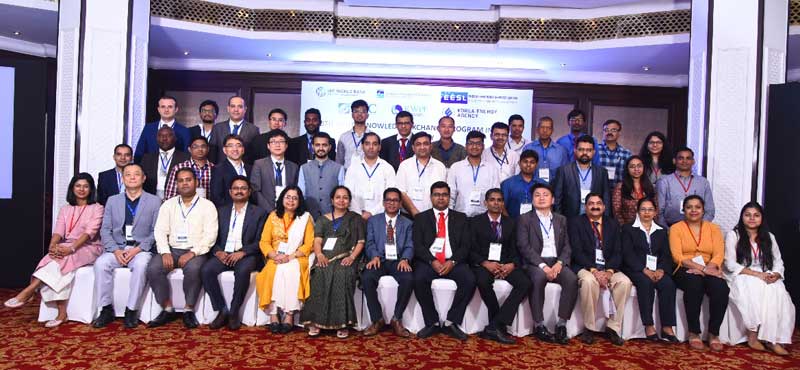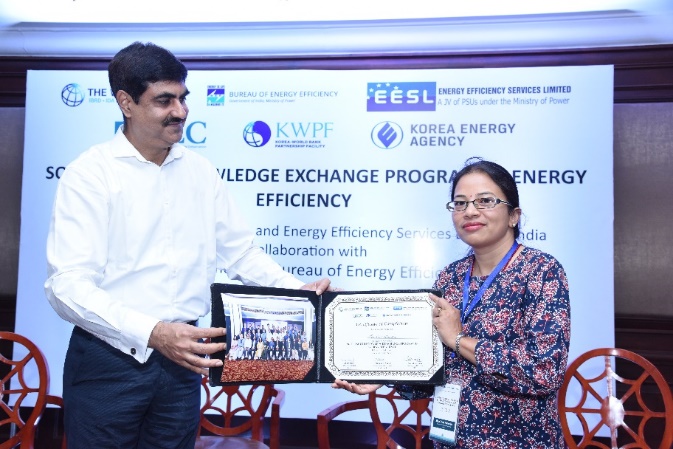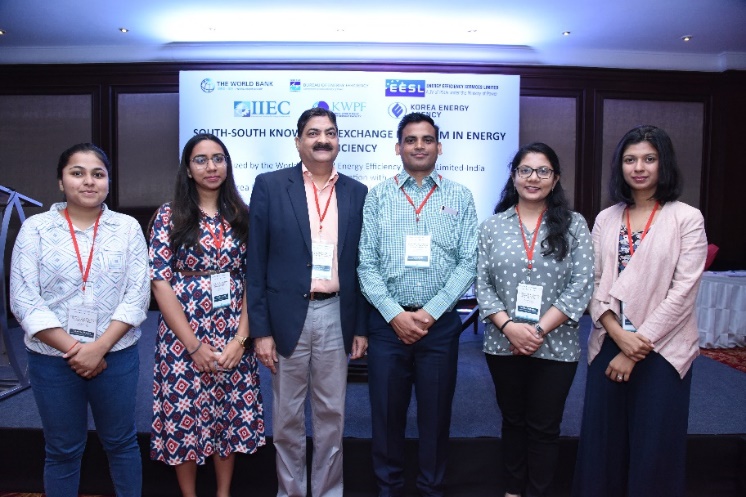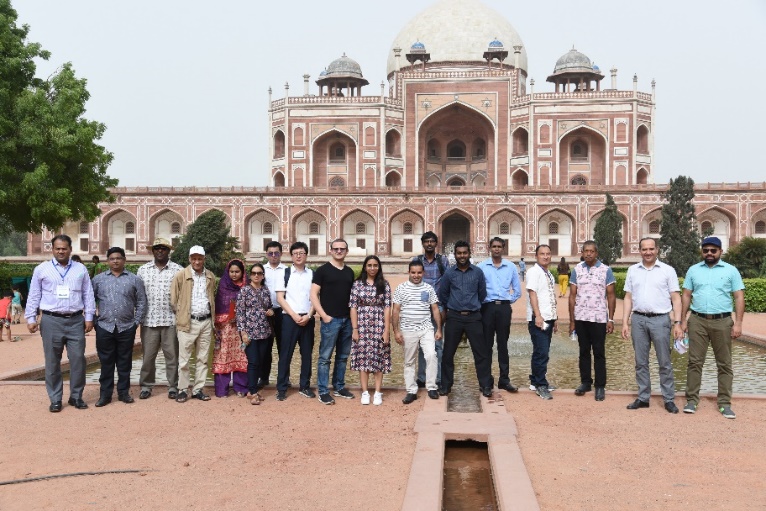IIEC Recent News
South – South Knowledge Exchange Program in Energy Efficiency, June 11-15, 2018 | New Delhi, India
The governments in South Asian countries are looking at energy efficiency as the “first fuel” for economic development – in which they can invest ahead of other energy sources and as one of the most viable options for mitigation of climate change. The regional importance of South Asian countries cannot be ignored. Increasing urbanization, economic growth and expanding middle class is contributing to a growing energy demand. The countries in South Asia region have already started taking steps and making efforts to scale up energy efficiency as part of meeting their national goals through their low-carbon roadmaps and to help achieve their global commitments through the Nationally Determined Contributions (NDC) targets.
 The International Institute for Energy Conservation-India (IIEC-India) had been commissioned as a lead organizer and technical consultant by the World Bank Group and EESL to deliver the South-South Knowledge Exchange (SSKE) Program in Energy Efficiency, a five-day knowledge exchange program in June in New Delhi, India. The program was designed as a collaborative platform to provide opportunities to South Asia Region (SAR) countries for knowledge exchange and learning in order to enhance their capacity to deliver energy efficiency (EE) and Demand Side Management (DSM) programs in their respective countries.
The International Institute for Energy Conservation-India (IIEC-India) had been commissioned as a lead organizer and technical consultant by the World Bank Group and EESL to deliver the South-South Knowledge Exchange (SSKE) Program in Energy Efficiency, a five-day knowledge exchange program in June in New Delhi, India. The program was designed as a collaborative platform to provide opportunities to South Asia Region (SAR) countries for knowledge exchange and learning in order to enhance their capacity to deliver energy efficiency (EE) and Demand Side Management (DSM) programs in their respective countries.
Forty energy efficiency practitioners from Bangladesh, Bhutan, Cote d’Ivoire, Nepal, Sri Lanka, Maldives, Morocco, Kenya, Mauritius, Korea and India participated in the South-South Knowledge Exchange Program in Energy Efficiency. The program was organized by the World Bank and Energy Efficiency Services Limited (EESL), India in collaboration with Korea Energy Agency (KEA) and the Bureau of Energy Efficiency (BEE), India with support from the Korea-World Bank Partnership Facility (KWPF). The exchange program consisted of three days of classroom training and two days of site visits.
 Inaugurated by Mr. S.P. Garnaik, Chief General Manager, EESL, India; set the context of the evolution of energy efficiency in India and flagship programs launched by the Government of India such as the standard and labeling and testing of electric appliances programs. Referring to this successful initiative he mentioned, “With new technologies coming to the market, saving potential is increasing every year” He also highlighted the need of transformation under four domains namely – technology, regulatory, institutional and financial.
Inaugurated by Mr. S.P. Garnaik, Chief General Manager, EESL, India; set the context of the evolution of energy efficiency in India and flagship programs launched by the Government of India such as the standard and labeling and testing of electric appliances programs. Referring to this successful initiative he mentioned, “With new technologies coming to the market, saving potential is increasing every year” He also highlighted the need of transformation under four domains namely – technology, regulatory, institutional and financial.
Representatives from each country were given the opportunity to present the state of energy affairs in their country. Mr. Rezaul Hoq, Director, Sustainable and Renewable Energy Development Authority (SREDA), Bangladesh mentioned, “Industrial sector dominates energy consumption in Bangladesh and that remains the first priority where Bangladesh wants to introduce EE measures”. Mr. Ahmed Bouzid, Energy Efficiency Manager National Investment Company for Energy, Morocco emphasized during his presentation that “it is not one approach that needs to be adopted but multiple approaches are required for achieving energy efficiency”.
Sharing insight into the energy efficiency situation in the industrial sector in India, Mr. Girish Sethi, Senior Director, TERI stressed on “Converting energy audits to implementation for ensuring the right measures be taken. First fuel is energy efficiency and then comes renewable energy. You generate what you consume. Consume efficiently to generate less”. Country stories and policies were also shared by the South Korean representatives.
 Day 3 of the program opened with theme talks delivered by eminent energy specialists Dr. Ajay Mathur, Director General, TERI, Mr. Saurabh Kumar, Managing Director, EESL and Dr. Ashok Sarkar, Senior Energy Specialist, World Bank.
Day 3 of the program opened with theme talks delivered by eminent energy specialists Dr. Ajay Mathur, Director General, TERI, Mr. Saurabh Kumar, Managing Director, EESL and Dr. Ashok Sarkar, Senior Energy Specialist, World Bank.
Dr. Mathur highlighted the importance of the need of the consumers and relevant data for the successful implementation of any energy efficiency program and policy in India or worldwide. Mr. Saurabh Kumar, Managing Director, EESL, was encouraging about the need for such exchange programs. “These exchange programs are important. Such exchanges have helped in the transfer of knowledge and experience, helps us to do what we do”.
There was a lot of talk about access to finance and the potential of investments in energy efficiency programs. Dr. Ashok Sarkar, Senior Energy Specialist from World Bank announced the recently approved USD 300 million loan to EESL for scaling up energy efficiency programs in India. “This is the first of its kind in the world for enhancing the efforts in energy efficiency.” Dr. Sarkar shared, “of this loan, 80 million USD would be used to generate more bonds”.
 Citing the example from Korea, Dr. Sarkar shared how Korea Energy Management Corporation evolved to a globally reputed Korea Energy Agency through initial support from the World Bank. He also stressed the importance of implementation. “Knowledge and codes are already there in the market, and also present in every country, for that matter. What’s lacking is implementation. Such exchange programs are there to share practices and challenges and implement in your own country”.
Citing the example from Korea, Dr. Sarkar shared how Korea Energy Management Corporation evolved to a globally reputed Korea Energy Agency through initial support from the World Bank. He also stressed the importance of implementation. “Knowledge and codes are already there in the market, and also present in every country, for that matter. What’s lacking is implementation. Such exchange programs are there to share practices and challenges and implement in your own country”.
Recognizing the commonalities and potential in the South Asian countries have recognized the enormous potential of energy efficiency and have established foundational institutional structures for the implementation of energy efficiency measures. However, some of these new institutions are still in an early development stage.
Mr. Sanjay Dube, Director, IIEC India, concluded the program by encouraging participants to interact with speakers and with each other. “We hope that through such programs participants are able to build long-term fruitful partnerships to design and implement innovative EE programs in their respective countries and learn from each other”.

 |
 |
|
 |
||
Download the Report: please click here [pdf 2 mb] | About the SSKE Program in Energy Efficiency

